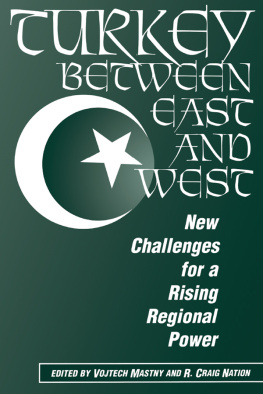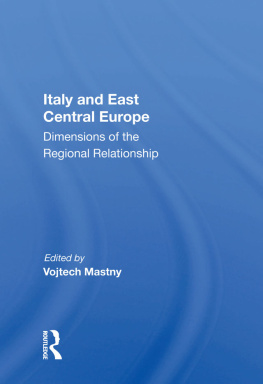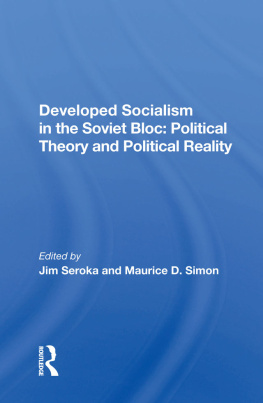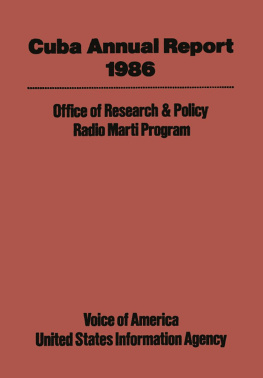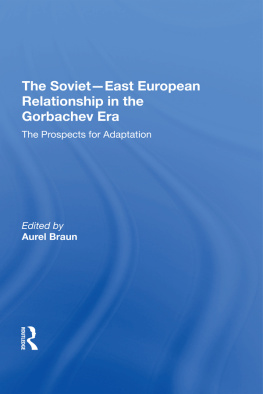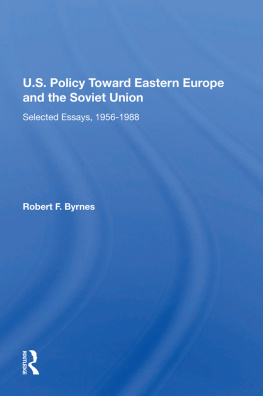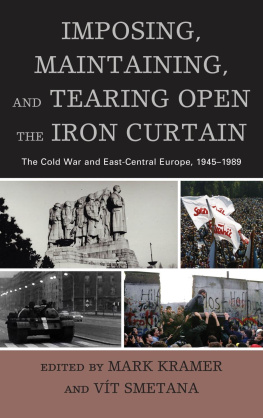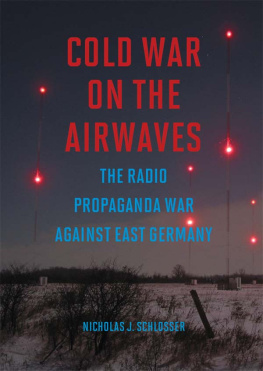Soviet/East European Survey, 1987-1988
Soviet/East European Survey, 1987-1988
Selected Research and Analysis from Radio Free Europe/Radio Liberty
Edited by
Vojtech Mastny
First published 1989 by Westview Press, Inc.
Published 2019 by Routeldge
52 Vanderbilt Avenue, New York, NY 10017
2 Park Square, Milton Park, Abingdon, Oxon OX14 4RN
Routledge is an imprint of the Taylor & Francis Group, an informa business
Copyright 1989 Taylor & Francis, except for the Introduction, which is 1988 Vojtech Mastny
All rights reserved. No part of this book may be reprinted or reproduced or utilised in any form or by any electronic, mechanical, or other means, now known or hereafter invented, including photocopying and recording, or in any information storage or retrieval system, without permission in writing from the publishers.
Notice:
Product or corporate names may be trademarks or registered trademarks, and are used only for identification and explanation without intent to infringe.
Library of Congress Catalog Card Number: 86-641367
ISBN 13: 978-0-367-28843-3 (hbk)
Contents
/ Vojtech Mastny
/ Vera Tolz
/ Alexander Rahr, Kevin Devlin
/ Elizabeth Teague
/ Elizabeth Teague
/ Douglas Clarke
/ Douglas Clarke
/ Vladimir Socor
/ Vlad Sobell
/ Sallie Wise
/ Patrick Moore
/ Stephen Ashley, Louis Zanga
/ Wayne Brown
/ Julia Wishnevsky
/ Vera Tolz
/ Philip Hanson
/ Andreas Tenson
/ Vlad Sobell
/ John Tedstrom
/ John Tedstrom
/ Philip Hanson
/ Viktor Yasmann
/ Bohdan Nahaylo, Elizabeth Teague
/ Aaron Trehub
/ Aaron Trehub
/ Louisa Vinton
/ Julia Wishnevsky
/ Saulius Girnius
/ Ann Sheehy
/ Elizabeth Fuller, Kevin Devlin
/ Oxana Antic
/ Bess Brown, Anne Bohr
/ Peter Martin, Kevin Devlin
/ Barbara Donovan
/ Vladimir Socor
/ Barbara Donovan
/ Milan Andrejevich
/ Judith Pataki
/ Vladimir V. Kusin
/ Vera Tolz
/ Vladimir V. Kusin
/ Bohdan Nahaylo
/ Barbara Donovan
/ Alfred Reisch, John Reed, Judith Pataki, Edith Markos
/ Kroly Okolicsanyi
/ Alfred Reisch
/ Alfred Reisch
/ Bennett Kovrig
/ Milan Andrejevich
/ Vlad Sobell, Ljubo Sirc
/ Milan Andrejevich
/ Milan Andrejevich
/ Vladimir V. Kusin
/ Stephen Ashley, Louis Zanga, Jan B. de Weydenthal, Jan Obrman, Peter Martin
/ Alfred Reisch
/ Barbara Donovan
/ E. Kautsky
/ Richard W. Judy
/ Elizabeth Teague
/ Dawn Mann
/ Viktor Yasmann
/ Michael Shafir
/ Vladimir V. Kusin
Guide
Preparing the fifth annual volume of Soviet/East European Survey was an experience at once heartening and soberingin regard to both the overwhelming subject matter and the technicalities involved.
So much happened in the Soviet part of the world during the year that even the most inveterate of skeptics must regard as good; yet the fragility of the good was painfully evident. In the selection and interpretation of the major themes, the balance between hope and sobriety was difficult to strike. It was often agonizing to decide what, in a longer perspective, was most likely to prove important and lasting rather than dated and ephemerala particularly daunting task for an editor reared as a historian.
As far as the technical matters are concerned, the heartening novelty was the introduction of a state-of-the-art word processing and printing system, which eventually made the publication of the book much speedier without any sacrifice of its physical appearance. Yet the many defects and breakdowns that had to be overcome before the system was made to work with perfection served as sobering reminders of the fragility of the technology on which we are so unwisely inclined to depend.
In overcoming these difficulties while performing the crucial task of associate editor, Clodagh Devlin again deserves the greatest creditthe more so since the editor's presence in Munich, where the project took place, was more limited than before. Its progress, despite his other research and writing assignments as a fellow of the Bundesinstitut fr ostwissenschaftliche und internationale Studien in Cologne, was greatly facilitated by the excellent working conditions provided by the Institute.
In Munich, the skill and dedication of Joan Shields, Cameron Hudson, Claude Spiese, and David Wakeman were crucial in making the computers work as they should. Clari Kovacs again provided her typing expertise at important times. Thanks are also due to Evan A. Raynes for preparing the index.
Vladimir Kusin, RFE's deputy director of research, was an infallible source of support. Kenneth Thompson, Director of Corporate Affairs, and Stephen Miller, Assistant Director of Corporate Affairs at the Washington office, proved invaluable for the timely completion of the project.
At Westview Press, its director Frederick A. Praeger and Susan L. McEachern gave the project their keen interest and expert attention.
Vojtech Mastny
Wassenaar, Netherlands
The Waning of the Soviet System
Vojtech Mastny
In the time between the Soviet party plenum in June 1987 and the party conference a year later, changes took place that made the Soviet system of power, as it had been known for seventy years, seem increasingly a matter of the past. If its crucial hallmarks had been the arbitrary exercise of political and economic power, habitual mendacity, routine disregard of individual rights and external expansionism, General Secretary Mikhail Gorbachev's program of perestroika, glasnost, and democratization, complemented by "new thinking" in foreign policy, meant that the system was beginning to wane. The seemingly meager accomplishments in view of what needed to be accomplished must not be construed to deny the fundamental character of what was being attempted. The changes often created more problems than they solved and still provided no institutional guarantees against a reversal. Yet the program showed the political will necessary to proceed with changes substantive enough to make it irreversible. In ways never experienced before, the Soviet Union was becoming a better country to live in and live with.
Having inherited from his predecessors a system decisively shaped by Stalin, Gorbachev at last confronted unequivocally the tyrant's legacysomething that he had hesitated to do earlier. Stalin's misdeeds were condemned as the crimes they were, rather than being circumvented as errors or distortions. Most of his prominent victims, including Nikolai Bukharin and others who had for decades served as the rogues' gallery in the Soviet political mythology, were not only legally rehabilitated but also recognized as what they had been, namely, good Bolsheviks. The rehabilitation did not extend to one of the best of all, Lev Trotskii, whose revolutionary adventurism was not a legacy Gorbachev could comfortably invoke. Also, Stalin's foreign policy, whichunlike his domestic recordhad been previously sacrosanct as having allegedly served the nation's interests well, was at last subjected to the criticism it deserved. In a critique suggestive of the new willingness to ask the right questionsthe most appealing feature of glasnostthe unavoidable issue of Lenin's responsibility for the system that made Stalin possible was at least tentatively posed. So was the venerated founding father's role in frustrating pre-revolutionary Russia's promise of pluralismthe promise now back on the agenda as a desirable goal.


